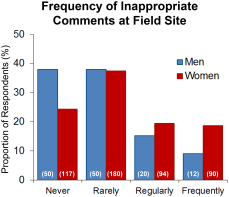
Figure 1. Proportion of survey respondents, by gender, who indicated that inappropriate or sexual comments occurred never, rarely, regularly, or frequently at their most recent or most notable field site (N).
doi:10.1371/journal.pone.0102172.g001
Important conversations are best addressed with good data. Science has a sexism problem and not all of it is of the passive, unconscious variety. As Kathryn Clancy, Robin Nelson, Julienne Rutherford, and Katie Hinde show in a new paper in PLoS One (“Survey of Academic Field Experiences (SAFE): Trainees Report Harassment and Assault”), sexual harassment and assault is disturbingly common at scientific field sites. They find that when women are the victims it is most likely that the perpetrator is a superior, which allows abuse of the hierarchical power dynamic. They also find that codes of conduct are absent or unknown, that clear reporting systems are often unknown, and that the existing reporting systems often fail to address the issues satisfactorily.
ABSTRACT
Little is known about the climate of the scientific fieldwork setting as it relates to gendered experiences, sexual harassment, and sexual assault. We conducted an internet-based survey of field scientists (N = 666) to characterize these experiences. Codes of conduct and sexual harassment policies were not regularly encountered by respondents, while harassment and assault were commonly experienced by respondents during trainee career stages. Women trainees were the primary targets; their perpetrators were predominantly senior to them professionally within the research team. Male trainees were more often targeted by their peers at the research site. Few respondents were aware of mechanisms to report incidents; most who did report were unsatisfied with the outcome. These findings suggest that policies emphasizing safety, inclusivity, and collegiality have the potential to improve field experiences of a diversity of researchers, especially during early career stages. These include better awareness of mechanisms for direct and oblique reporting of harassment and assault and, the implementation of productive response mechanisms when such behaviors are reported. Principal investigators are particularly well positioned to influence workplace culture at their field sites.
Filed under: Follies of the Human Condition Tagged: Feminism, Julienne Rutherford, Kathryn Clancy, Katie Hinde, Linkonomicon, PLoS, PLoS ONE, Robin Nelson, science, Sexism, sexual harassment